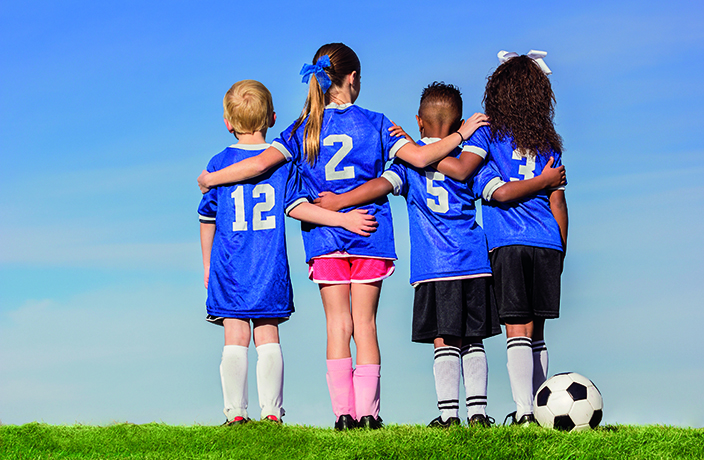Why did you get your child involved in youth sports? This is not a rhetorical question. When you signed your son or daughter up for their first soccer or basketball league, what did you want your child to get out of the experience? Learning teamwork, exercise, socialization, collaboration, sacrifice and responsibility are well known benefits of sport that draw many parents to enroll their child in youth sports. However, as the years progress, teams and coaches that once emphasized equal playing time and collaboration transition into an abject reality of competitiveness that can be physically and emotionally hard to deal with.
With a little key knowledge, you as parents can help arm your young athletes at home with cognitive tools that can aide them in skill development and sport specific stress management.
Many parents view their child’s athletic success from purely a physical perspective. Sports are of course physical in nature, however, a false dichotomy persists in the collective consciousness between mind and body. In youth sports, research informs us that the mind plays a large role in individual success. These findings are based off of a theory created by Albert Bandura of Stanford University who believes that previous successful performance and emotional arousal lead to high levels of self-efficacy. Thus, the best athletic structures for young children are ones that create opportunities of success for all athletes. The more success a young athlete has early on, the greater his or her self-efficacy, and the greater his or her perseverance in the face of future athletic adversity.
I know what you’re thinking - this does not mean we don’t keep score and pass out ‘You won too!’ awards to every athlete. What it means is that skills and components of the sport should be broken down into individual elements, and mastery of those elements should be acknowledged and celebrated frequently by coaches and parents.
“The more success a young athlete has early on, the greater his or her self-efficacy, and the greater his or her perseverance in the face of future athletic adversity”
These findings and practices apply to another motivational theory in athletics, Cognitive Evaluation Theory. CET emphasizes the value and importance of intrinsic versus extrinsic motivation. High levels of self-efficacy result in an intrinsic orientation to athletic tasks, which lead to higher levels of performance, more on task practice hours, and better stress management.
As parents, you can leverage these motivational theories by celebrating your young athletes’ successes on specific sport-related tasks. For example, if your daughter is one of the worst players on her U-8 football team, you should focus her attention and your praise on any small detail that she was successful at such as ‘staying in position’ or ‘controlling the ball.’ This is also where parents should capitalize on the work of Carol Dweck of Stanford and praise their child’s character strengths, “The effort you displayed during the game was so great! Good job!” Or, “When the other team scored a goal on you, you didn’t give up; I love your perseverance!”
Of course, it would be nice if youth her coach did all the above, but it is not always the case. If your child’s coach is lacking in the process or skill praise department, it is very important that you provide frequent and consistent praise in order to counter-act the success-ambiguous or even negative commentary that will decrease your child’s self-efficacy and intrinsic motivation; and in turn their overall athletic success.
As your child gets older (age 8 to young adult), you can start to have them engage around one of the most researched and successful cognitive strategies for athletic success: self-talk.
The performance enhancing technique of self-talk is also related to the self-efficacy theory of achievement as it facilitates intrinsic motivation as well as self-esteem. Self-talk is the practice of verbalizations addressed to the self that serve to be instructional and motivational.
Golf and tennis have been the two most researched sports in this regard. Consistently, positive self-talk has shown to result in greater performance while negative self-talk was associated with decreased performance.
Parents should encourage their young athletes to use positive self-talk to increase their emotional arousal, emphasize previous successful performance, increase intrinsic motivation and increase athletic success!
As a 10-year varsity basketball coach married to a Big-10 scholarship basketball player, our family is no stranger to the good and the bad of youth athletics. As our children grow intellectually and athletically, we’ll try to stay focused on why we got them involved in sports in the first place. Placing our children in youth programs that are aligned with what psychological science informs us is best practice will help keep our family focused on what really matters. And if when our children reach the age that they can decide continue in sport or not on their own, we’ll teach them the value of self-talk for the mind is a powerful performance enhancing tool.


















